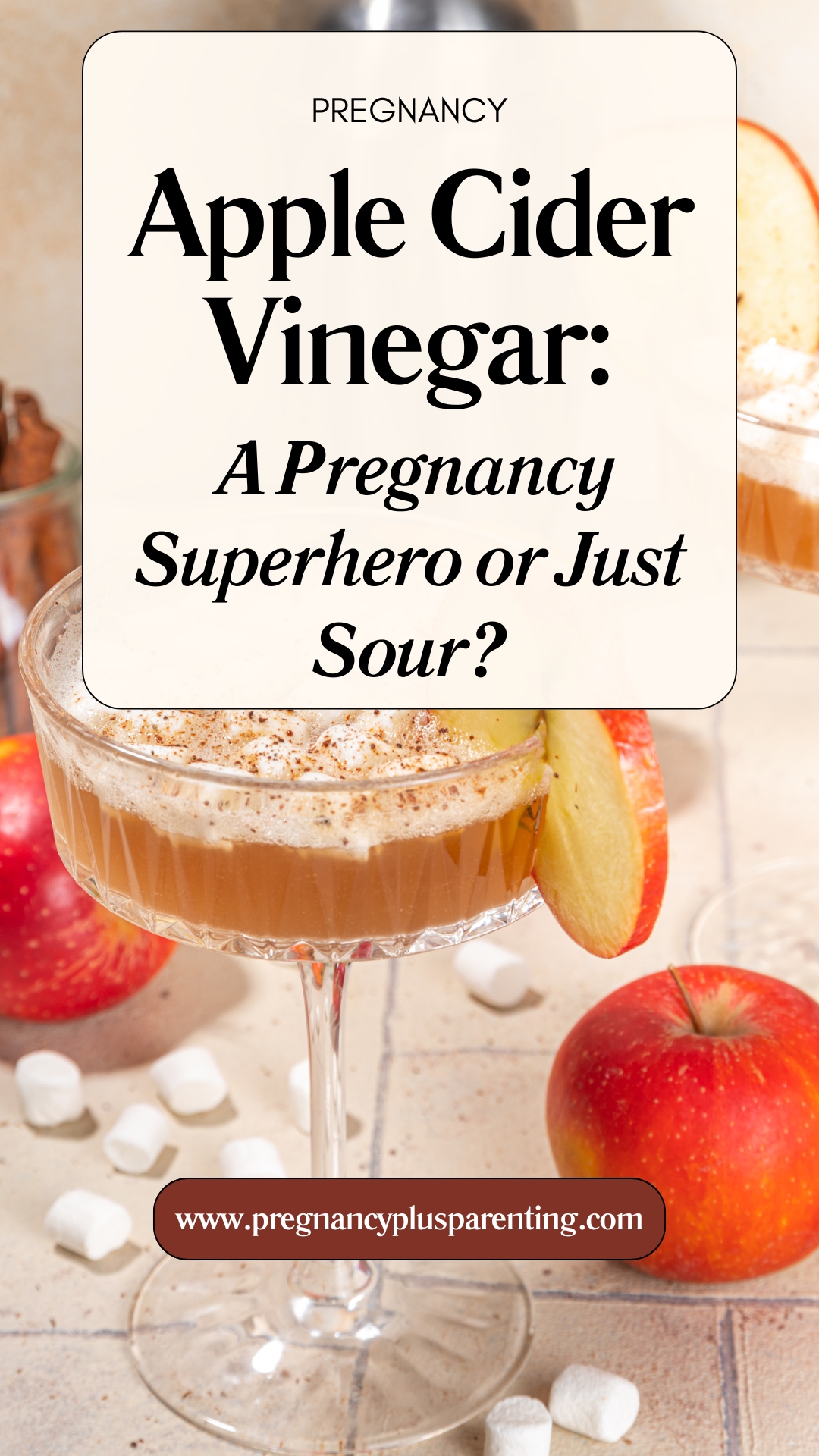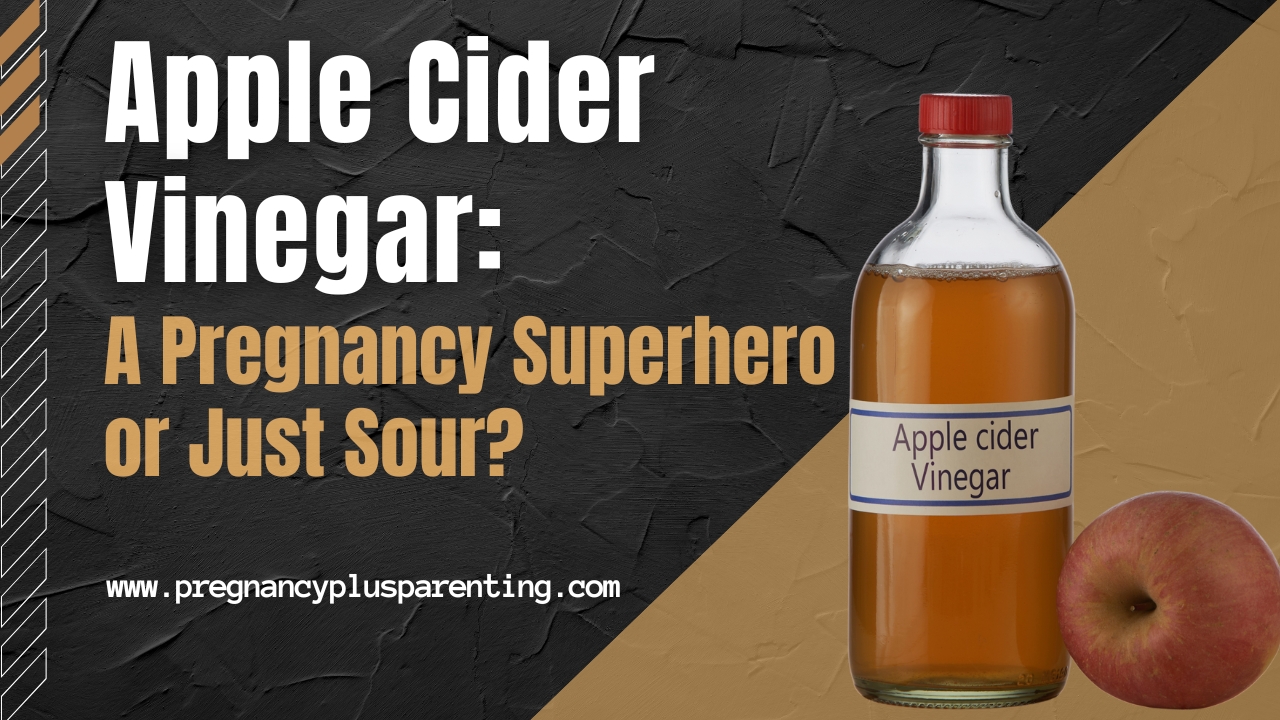Apple Cider Vinegar: A Pregnancy Superhero or Just Sour?
Everyone knows the stories of strange cravings of pregnant women, but not everyone knows how many foods have to be banned from a pregnant woman’s diet because they could harm the unborn child.
Does this even apply to apple cider vinegar during pregnancy?
Can something used as a home remedy for various ailments be harmful to expectant mothers and their babies? Or is it nothing to worry about?
What effects are said to have on apple cider vinegar and which are scientifically proven?
And can there be unpleasant side effects if you overdo it with consumption?
In this article you will find the answers.
Apple cider vinegar during pregnancy – How is vinegar made?
The production of this spice can be divided into two phases.
First, the apples are fermented, cut into pieces and left to ripen in water with sugar and yeast for two to three weeks.
This creates alcohol or apple cider and air bubbles become visible in the mixture, while the apples have sunk from the surface to the bottom.
Bacteria have converted the sugar into alcohol and the first phase of production is now complete.
During the second fermentation phase, the cider becomes vinegar, with the mixture containing three to nine percent acetic acid.
It takes a rest period of several weeks for sediment to form on the bottom and streaks on the surface, which are called mother of vinegar.
Now you just wait until the desired aroma and flavor develop. Apple cider vinegar can be stored in sealed bottles for months and years.
Although it becomes more acidic over time, adding water will soften the taste.
Now, organic and naturally cloudy vinegar is not pasteurized.
Although it is heated during production, it is not heated above 70 degrees Celsius so that the mother of vinegar is preserved.
However, even with unpasteurized vinegar there is no risk of infection, because vinegar is actually used to protect against bacteria.
You can use apple cider vinegar during pregnancy if you feel like it.
Also, make sure the variety you choose doesn’t contain alcohol. Otherwise, a low alcohol content must also be indicated on the label.
By the way, did you know that non-alcoholic sparkling wine or non-alcoholic beer does not mean that the drinks are completely free of alcohol?
By law, drinks may be labeled as non-alcoholic if they contain less than 0.5% alcohol by volume.
However, when consumed in small quantities, it is not only safe but also healthy for you and your baby.
Apple cider vinegar during pregnancy – what are the health benefits?
High-quality vinegar contains minerals, vitamins and trace elements that boost the metabolism and strengthen the immune system.
Apple cider vinegar for skin during pregnancy – Whether for headaches, nausea, asthma or for beautiful skin, nails and hair – apple cider vinegar is used as a miracle cure for so many things.
It is said to help lower blood sugar levels, high blood pressure, cholesterol and blood fat levels and support the treatment of diabetes.
It also supports digestion and makes weight loss easier.
It can even be used externally to treat warts, sunburn, bites and fever.
Apple cider vinegar for cystitis during pregnancy – Scientifically proven to have antibacterial properties that prevent bacteria from multiplying.
So you drink apple cider vinegar to fight bladder infections and heal open wounds.
Because of its disinfectant properties, it is also used as a cleaning agent to remove bacteria and limescale.
In some households, surfaces, floors and windows are often cleaned with vinegar.
Apple cider vinegar for heartburn during pregnancy – And some people drink vinegar regularly to cleanse the intestines and prevent or relieve digestive problems such as bloating and constipation.
It also helps with heartburn and bloating.
Similar to mustard , apple cider vinegar has an alkalizing effect on the body despite its sour taste, as the organic acids from the vinegar are used to produce energy and after metabolism only the alkaline nutrients such as potassium remain.
This calms the acid-base balance and regulates stomach acid.
Two tablespoons of apple cider vinegar and a glass of warm water can also help against the notorious morning sickness .
Drink apple cider vinegar – You should always drink vinegar diluted with water so that the acid does not irritate your gastrointestinal tract.
If you are sensitive, you should not drink the mixture on an empty stomach.
You can also add a teaspoon of honey to the glass of water in addition to 2 tablespoons of apple cider vinegar so that it doesn’t taste so sour.
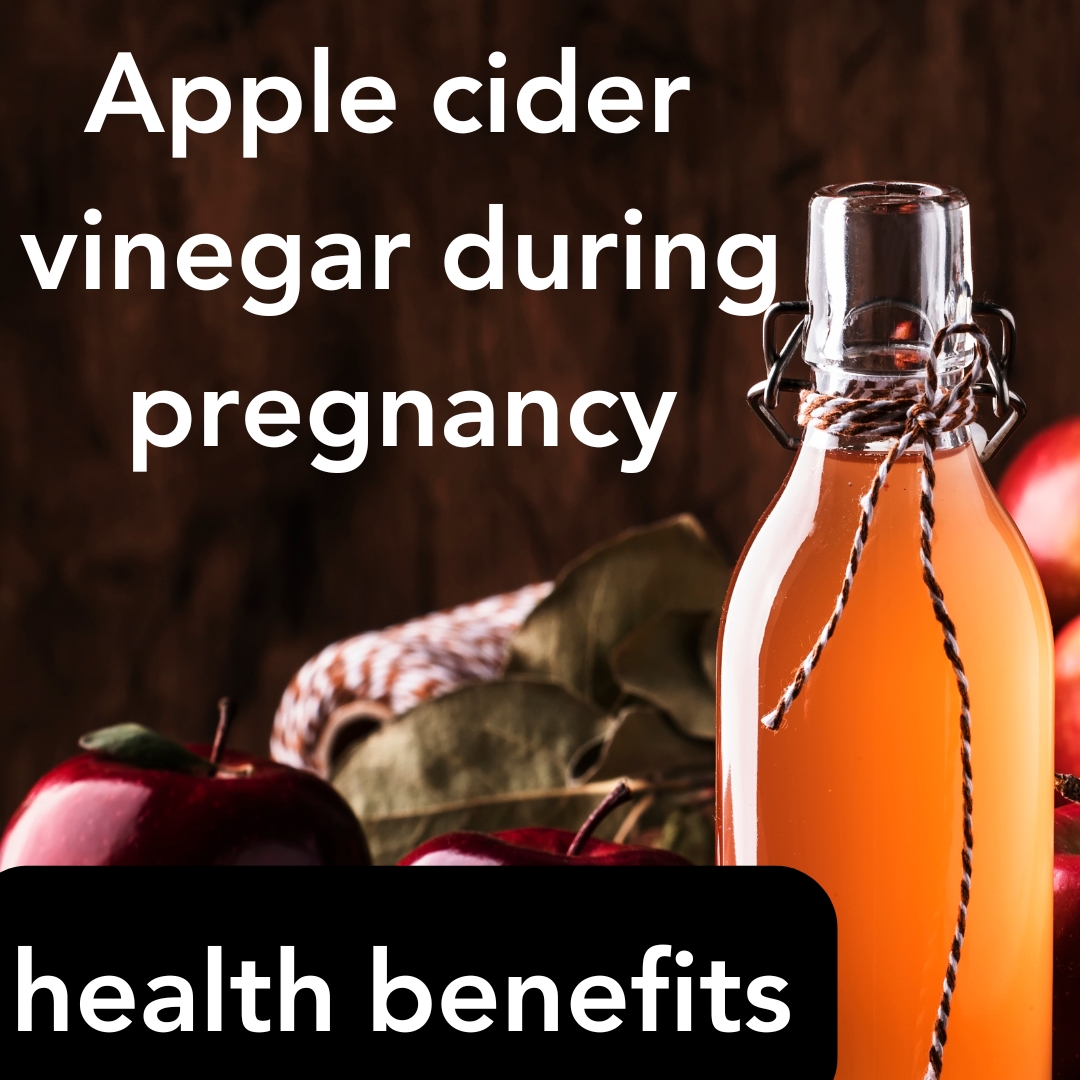
Apple cider vinegar during pregnancy – what are the risks?
It is not recommended for pregnant women to go on a vinegar diet and drink it daily, as a certain alcohol content remains despite the presence of acetic acid bacteria.
Occasionally this can be ignored, similar to apple juice or kefir, but you don’t know how little alcohol could be too much for the baby in your belly.
In addition, the acid in vinegar is not entirely harmless, especially when it comes to the mouth area.
The acid can attack tooth enamel and also promote anemia by damaging red blood cells. Apple cider vinegar can also cause intestinal ulcers.
Even though it contains less of the critical acetic acid and more of the health-promoting maleic acid than, for example, spirit vinegar, you should consume smaller amounts and, if in doubt, avoid drinking vinegar.
Like any food or household remedy, apple cider vinegar can have side effects, especially if you have a sensitive stomach and intestines.
If you experience symptoms such as headaches, dizziness, stomach pain or nausea while consuming the product, you should stop taking it immediately.
External use can also have undesirable consequences if you have very sensitive skin that reacts with irritation.
In any case, it is best to discuss it with your doctor if you want to use apple cider vinegar as a home remedy or consume it regularly.
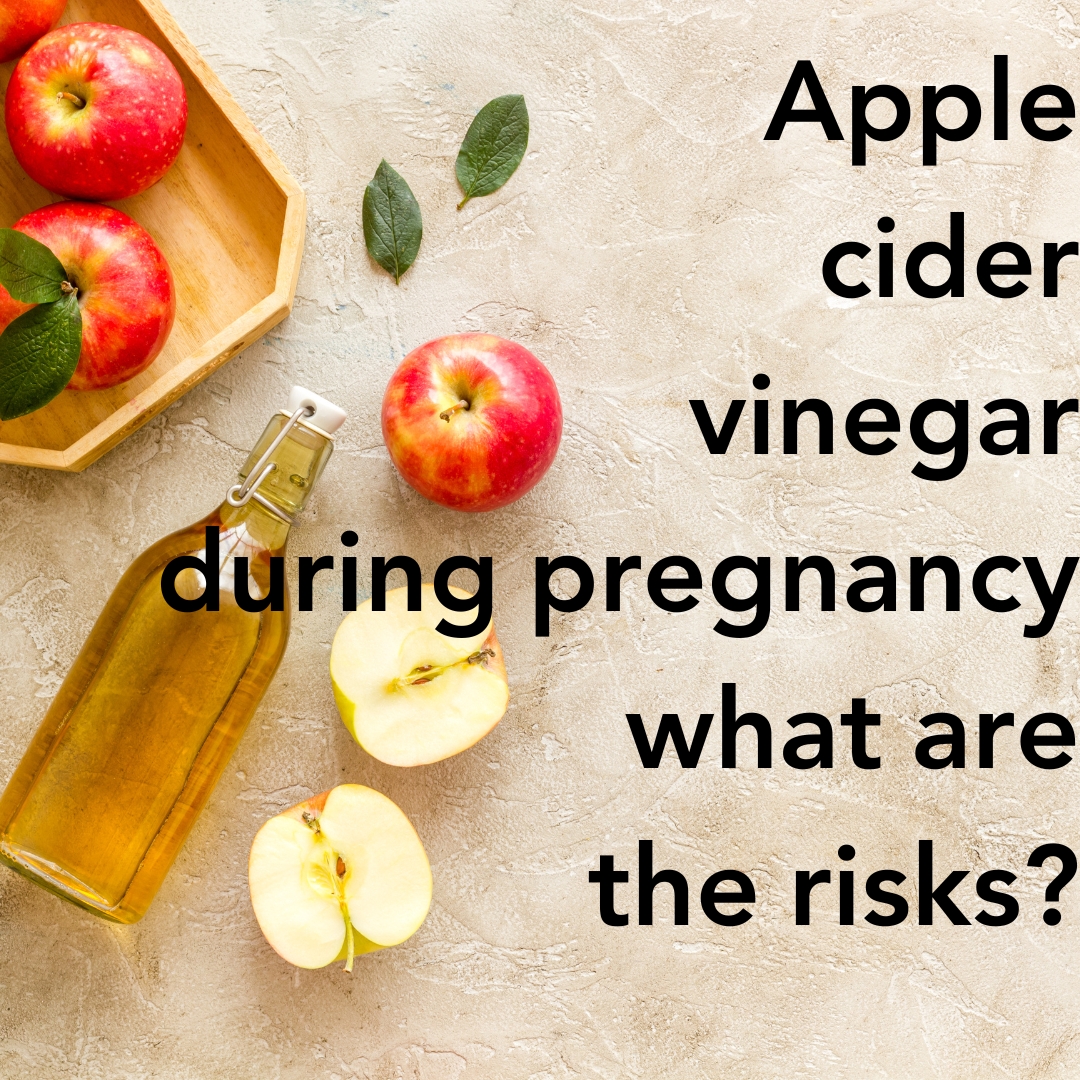
Apple cider vinegar during pregnancy – what nutrients does it contain?
Because apple cider vinegar is made from fermented apples, where alcohol is fermented into acetic acid, many of the nutrients that apples naturally contain are lost, but more are also added during fermentation.
The most important ingredients include:
• Vitamin A
• Vitamin B1, B2, B6
• Vitamin C
• Vitamin E
• Beta-carotene (precursor to vitamin A)
• Folic acid (vitamin B9)
• Potassium
• Calcium
• Magnesium
• Sodium
• To demand
• Zink
• Phosphate
• Copper
• Fluor
• Selenium
• Iodine
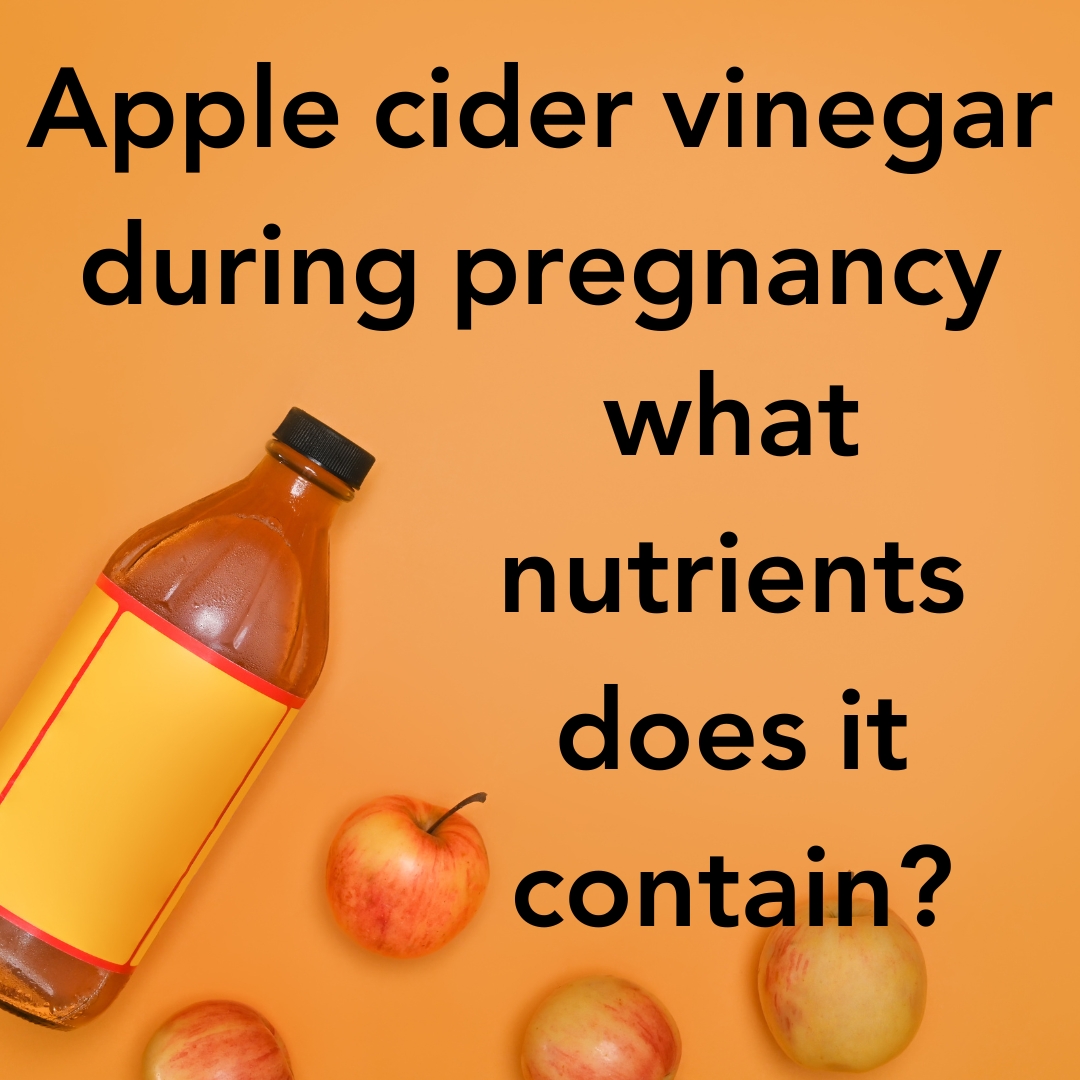
Apple cider vinegar during pregnancy – What to consider when buying
During pregnancy, a balanced diet with high-quality foods is essential.
That’s why you should also make sure that the vinegar you choose is a good quality product.
Organic apple cider vinegar is usually naturally cloudy, meaning it is unfiltered and unpasteurized and is made from whole fruits.
If you want good vinegar, it’s worth going to a health food store instead of a supermarket.
After all, most of the industrially produced products you find there aren’t made from whole apples, but from apple scraps and cores, and are loaded with additives. That’s not healthy.
With manufacturers like Heinz and Bragg, for example, you can be sure that you are buying good quality apple cider vinegar.
You should avoid dietary supplements containing vinegar powder altogether, even if the advertising promises seem tempting.
Apple cider vinegar during breastfeeding
Things that do not harm or bother the baby during pregnancy, such as eating spicy food , do not have to remain so during breastfeeding.
Through breast milk, your baby receives all the ingredients unfiltered, but cannot tolerate everything well.
Acidic foods can cause unpleasant symptoms in babies, such as flatulence and a sore bottom.
The digestive tract is still developing and cannot cope with the acid.
Therefore, apple cider vinegar and other types of vinegar are not suitable for feeding small children up to the age of two.
However, when used externally, for example to reduce fever, this remedy is still suitable.
Final thoughts
Apple cider vinegar has been considered a real immune booster for some time now and is used as a home remedy for just about anything you can think of – for general strengthening and a beautiful appearance, for weight loss and as a natural prebiotic, as well as for the relief of various ailments.
For athlete’s foot, a foot bath with apple cider vinegar helps; for sore throats and bad breath, you can gargle it diluted with water; and it can also help with heartburn, nausea, and varicose veins.
Not everything that has been said about apple cider vinegar in natural medicine (since the ancient Romans) has been scientifically proven, but its antibacterial effect certainly has.
That’s why you can also use unpasteurized and naturally cloudy vinegar, as there is no risk of becoming infected with germs and bacteria.
In this post, I have presented the health benefits of consuming apple cider vinegar during pregnancy, but also mentioned the risks.
If you have a sensitive stomach, you should consult your doctor first before you start drinking it regularly or pouring it on your coleslaw .
